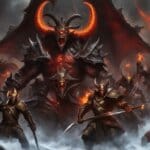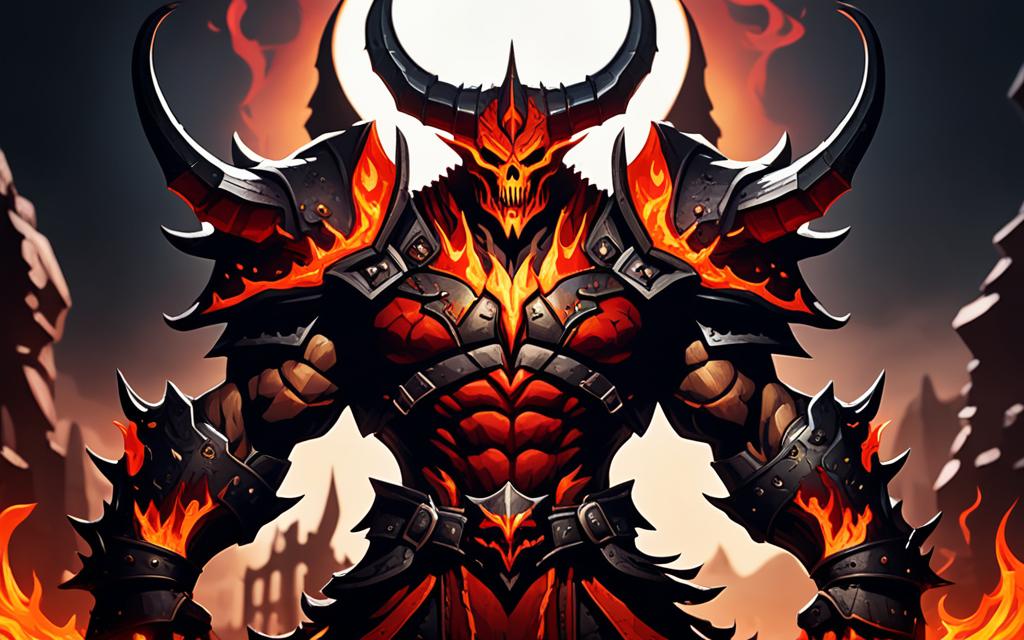Table of Contents
Diablo, a term laden with significance and symbolism, has a deep-rooted meaning that extends beyond the realm of mere video games. In Diablo, it encompasses a variety of entities, ranging from demons to the central antagonist of the beloved game series. At its core, Diablo embodies the essence of darkness, evil, and temptation, representing divine opposition in Jewish and Christian folklore. The term holds profound significance in the lore and narrative of the Diablo games, driving the perpetual conflict between forces of good and evil.
But what exactly does Diablo mean? Delving into its mythology, Diablo draws inspiration from various sources, such as the Jewish demon Lilith, one of the earliest known female demons associated with seduction and leading astray. Another parallel can be drawn between the character Andariel and Lilith, both manifesting similar demonic nature and roles within the game. Furthermore, elements from Bali mythology, like the demon queen Rangda, contribute to the development of Diablo’s characters and their motivations, infusing the game with depth and complexity.
Beyond its profound mythological roots, Diablo has made an indelible mark on gaming history. The iconic game series revolutionized the action role-playing genre, introducing the world to its captivating hack and slash gameplay mechanics. Since its initial release in 1997, the Diablo games have enticed players with immersive storytelling, addictive loot-based progression systems, and intense multiplayer experiences. Diablo’s success paved the way for other extraordinary games in the genre, solidifying its status as a staple in gaming history.
Within the Diablo series, symbolism plays a pivotal role, enriching the narrative and exploring profound themes in the gameplay. For instance, the number three embodies significant symbolism in the Diablo 4 cinematic trailer, representing balance and reconciliation of conflict. This symbolism intertwines with broader themes encompassing the eternal struggle between the High Heavens and the Burning Hells, as well as the desire for harmony and resolution. Blood, another recurring symbol, encapsulates life force and is ritualistically associated with demonic presence and sacrifice. The intricate weaving of symbolism and themes in Diablo adds layers of depth and meaning to the gaming experience.
Diablo’s Mythological Influences
The concept of Diablo draws inspiration from various mythological sources. One notable influence is the Jewish demon Lilith, who is considered one of the earliest known female demons. Lilith is associated with seduction and leading individuals astray. The character of Andariel, one of Diablo’s seven Evils, shares similarities with Lilith in terms of her demonic nature and role in the game. Additionally, elements from Bali mythology, such as the demon queen Rangda, also contribute to the development of Diablo’s characters and their motivations. These mythological influences add depth and complexity to the world of Diablo.
Diablo’s Impact on Gaming History
The Diablo game series has left an indelible mark on the history of gaming, revolutionizing the action role-playing genre and popularizing the hack and slash gameplay mechanics. Its impact can be traced back to the release of the first Diablo game in 1997, which introduced players to the immersive dark fantasy world of Sanctuary. This game depicted an ongoing conflict between humans and demons, captivating gamers with its intricate storytelling and atmospheric gameplay.
Building on the success of the first game, subsequent releases and expansions, such as Diablo II and Diablo III, continued to captivate audiences with their addicting loot-based progression system and intense multiplayer experiences. These games showcased Blizzard Entertainment’s commitment to crafting rich and immersive worlds that kept players engaged for hours on end.
Diablo’s influence extended far beyond its immediate genre. It inspired other developers to experiment with similar gameplay mechanics and storytelling approaches, leading to the emergence of countless action role-playing games that sought to capture the essence of Diablo’s addictive gameplay. This influence can still be felt in the gaming industry today, with elements of Diablo’s design philosophy present in many modern RPGs.
Furthermore, Diablo’s impact on multiplayer gaming cannot be overstated. The series introduced players to the concept of cooperative gameplay and player versus player combat, providing a social and competitive aspect that greatly enhanced the gaming experience. Diablo paved the way for the integration of online features in future games, revolutionizing the way players connect and interact with each other.
In summary, the Diablo game series has had a profound impact on the history of gaming. Its groundbreaking gameplay mechanics, immersive storytelling, and innovative multiplayer experiences have solidified its status as a beloved franchise and a staple in gaming history.
Symbolism and Themes in Diablo
Symbolism is a fundamental aspect of the Diablo game series, adding depth and complexity to the narrative and overall gameplay experience. One notable symbol is the number three, which holds significant meaning in the Diablo 4 cinematic trailer. Representing balance and reconciliation of conflict, this symbolism resonates with the eternal struggle between the High Heavens and the Burning Hells, as well as the human desire for harmony and resolution.
Another recurring symbol in Diablo is blood, which represents life force and is linked to the presence of demonic entities and sacrificial rituals. This symbolism enhances the dark and atmospheric nature of the game, emphasizing the power and dangerous allure of the demonic forces players encounter.
By skillfully weaving together various symbols and themes, the developers of Diablo have created a gaming experience that goes beyond mere entertainment. The intricate symbolism and thought-provoking themes explore the eternal conflict between good and evil, the struggle for balance, and the human capacity for redemption. This adds layers of meaning and depth to the Diablo universe, elevating it from a simple hack and slash adventure to a captivating exploration of profound concepts.
FAQ
What does the term "Diablo" mean?
In the world of Diablo, it refers to various entities, including demons and the overarching antagonist of the game series. It carries significant meaning and symbolism, representing darkness, evil, and temptation.
Where does the term "Diablo" originate from?
The origin of the term can be traced back to religious mythology, such as Jewish and Christian folklore. It draws inspiration from various mythological sources and contributes to the development of the game’s characters and narratives.
How has Diablo impacted the history of gaming?
The Diablo game series has had a significant impact on the history of gaming. It revolutionized the action role-playing genre, popularized the hack and slash gameplay mechanics, and established itself as a staple in gaming history through immersive storytelling and addictive gameplay experiences.
What is the significance of symbolism in Diablo?
Symbolism plays a crucial role in the Diablo game series, enriching the narrative and exploring themes in the gameplay. Symbols such as the number three and blood add depth and layers of meaning, representing balance, conflict, life force, and sacrifice.













